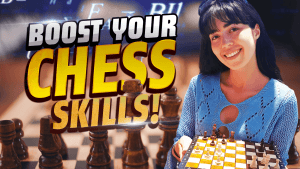
Most chess games are not lost in the opening.And surprisingly often, they’re not lost by a single blunder either.
They’re lost in the middlegame, when one player simply doesn’t know what to do next.
You’ve probably felt...

I’ve been playing chess since I was a child and have competed in a wide range of events, from youth tournaments like the World U10-U18 Championships to elite competitions such as the Chess Olympiads, European Team Championships, and internat...

Playing against a Grandmaster (GM) as an amateur can feel like stepping into a storm. Even when the first moves look normal, you quickly realize you’re being pulled into something you can’t control. The pressure is constant, the mistak...

It can be frustrating to feel stuck at your current skill level, but don't worry – there are steps you can take to overcome this plateau and continue improving. Here are some tips for what to do when you're stuck in a certain chess level:
...

Studying chess openings is an essential part of improving your game. A solid opening repertoire helps you reach favorable middlegame positions and avoid falling into early traps. However, many players make the mistake of memorizing moves without u...

Freestyle chess, also known as Fischer Random Chess or Chess960, is a chess variant designed to eliminate deep opening preparation and encourage creative play. It was invented by Bobby Fischer, the 11th World Chess Champion, to ensure that...

Improving at chess isn’t just about studying opening theory and solving puzzles. Many players reach a plateau at this stage and wonder what they are doing wrong. One of the best ways to break through is by playing structured training games. ...

When players castle on opposite sides, the game becomes more dynamic, and strategies change significantly. Instead of slow maneuvering, both sides focus on launching fast and aggressive attacks.
Why Opposite-Side Castling Leads to Sharp Pl...

If you’re serious about chess and want to establish yourself in the competitive scene, getting a FIDE rating is an essential step. A FIDE (Fédération Internationale des Échecs) rating represents your strength in official...

The O'Kelly Variation of the Sicilian Defense, characterized by 1.e4 c5 2.Nf3 a6, is a fascinating and unconventional choice for Black. This offbeat line sets a subtle trap as early as move 2, aiming to provoke White into revealing their plans pre...

Many club players stay at the same level despite their love for chess and playing a lot of games. This is often due to poor habits, mental blocks, and unfocused effort. Here are common reasons for stagnation and tips to improve, in...

What Is Blumenfeld’s Rule?
First shared by the Soviet master B. Blumenfeld and popularized by authors like Alexander Kotov in Think Like a Grandmaster, the rule advises:
When you have finished your calculations, write down the move you ...

Strengths
Identify what you’re good at and how to leverage it during games:
Strong Tactical Skills: Are you great at spotting tactics and combinations? Focus on sharp openings and middlegames to maximize your strength.
Positiona...

Your chess style is your personal approach to the game. Knowing your style helps you choose openings that suit your strengths and improve your weaknesses.
1. Aggressive and Tactical Players
Overview
Aggressive and tactical players lov...

The knight can be one of the most powerful pieces on the chessboard due to its unusual movement. Typically, it is looking for squares where it won't be chased away by the opponent's pawns, so-called protected squares or outposts.
Understanding t...

It’s been an exciting 7 days at BoltChess! This NEW platform connects chess players with titled players for Training Games! In just 7 days, we’ve seen interesting matches, great new features, and a growing community of chess enthusiast...

Most players start their chess journey with tactics (learning forks, pins, to win material or deliver checkmate) However, many hit a plateau as games become more complex. The next step is to improve positional play by understanding pawn structures...

Are you dreaming of the day you'll finally go head-to-head with a titled chess player? Why wait for a tournament or a stroke of luck? With BoltChess, you don’t have to! Imagine the thrill of challenging Grandmasters, International Ma...

Improving requires targeted strategies depending on your Chess.com rapid rating. Here’s how you can make steady progress:
0-1000: Focus on the BasicsAt this level, mastering the fundamentals is key. - Learn the Rules: Ensure you know ...

Most players (1200-2200 chess.com rating) are strong in tactics and openings, but their ratings don’t show it because their positional knowledge just isn’t up to par. In other words, they can never create the circumstances to exec...

The middlegame is one of the three fundamental parts of every chess game, including the opening and the endgame. Once the initial moves are completed and the players' positions are established, the middlegame begins. Similar to the other parts of ...

If you are an intermediate chess player, the first few moves in a chess game are considered the most crucial moves that most likely predict the middle game quickly as chances of making mistakes get limited. Over the last hundred years, thousands o...

One of the key concepts to master in pawn endgames is the idea of opposition.
What is Opposition?
The opposition, or direct opposition, is a situation where both kings face each other with only one square between them—either on a r...

Most of the players, after finishing their games starts playing another chess game, which is why regardless of playing too many games, it does not improve your tactical and strategical skills quicker. The first step to becoming a better chess play...

As an intermediate chess player, you may have already mastered the basics of tactics and have a good understanding of chess openings. However, there is always room for improvement and further development of your chess skills. This study plan is de...
























